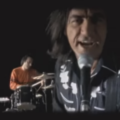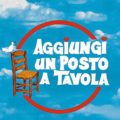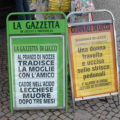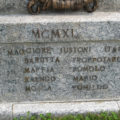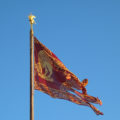| Le bionde trecce gli occhi azzurri e poi |
|
Blonde braids, blue eyes, and then |
| le tue calzette rosse |
|
your red socks |
| e l’innocenza sulle gote tue |
|
And the innocence on your cheeks ““ |
| due arance ancor piu’ rosse |
|
two oranges redder still |
| e la cantina buia dove noi, respiravamo piano |
|
And the dark cellar where we breathed softly |
| e le tue corse l’eco dei tuoi no, oh no |
|
And your running, the echo of your “no’s” ““ oh, no |
| mi stai facendo paura |
|
you’re scaring me |
| dove sei stata cosa hai fatto mai? |
|
Where you have you been, what on earth have you done? |
| una donna, donna, dimmi |
|
“A woman” ““ woman, tell me |
| cosa vuol dir sono una donna ormai? |
|
What does it mean: “I’m a woman now” ? |
| ma quante braccia ti hanno stretto tu lo sai |
|
How many arms have held you – you know [the answer] |
| per diventar quel che sei |
|
to become what you are? |
| che importa tanto tu non me lo dirai |
|
What does it matter – in any case, you won’t tell me. |
| purtroppo |
|
Unfortunately. |
| ma ti ricordi l’acqua verde e noi |
|
But do you remember the green water and us, |
| le rocce e il bianco fondo |
|
The rocks and the white sea floor? |
| di che colore sono gli occhi tuoi? |
|
What color are your eyes? |
| se me lo chiedi non rispondo |
|
If you ask me, I won’t answer. |
| oh mare nero, oh mare nero, oh mare ner |
|
Oh, black sea, oh black sea, oh black sea”¦ |
| tu eri chiaro e trasparente come me |
|
You were clear and transparent as me. |
| oh mare nero, oh mare nero, oh mare ne.. |
|
Oh, black sea, oh black sea, oh black sea”¦ |
| tu eri chiaro e trasparente come me |
|
You were clear and transparent as me. |
| Le biciclette abbandonate sopra il prato e poi |
|
The bicycles abandoned on the grass and then |
| noi due distesi all’ombra |
|
We two stretched out in the shade. |
| un fiore in bocca può servire sai |
|
A flower in the mouth can be useful, you know |
| più allegro tutto sembra |
|
Everything seems more cheerful. |
| e d’improvviso quel silenzio tra noi |
|
And suddenly that silence between us |
| e quel tuo sguardo strano |
|
And that strange look of yours. |
| ti cade il fiore dalla bocca e poi… |
|
The flower falls from your mouth and then… |
| oh no ferma ti prego la mano |
|
Oh, no, please – stop your hand. |
| dove sei stata, cosa hai fatto mai? |
|
Where have you been, what on earth have you done? |
| una donna, donna, donna dimmi |
|
“A woman” – woman? – woman, tell me |
| cosa vuol dir “sono una donna ormai”? |
|
What does it mean: “I’m a woman now” ? |
| Io non conosco quel sorriso sicuro che hai I don’t know that secure smile that you have |
| non so chi sei, non so piu’ chi sei |
|
I don’t know who you are, I don’t know who you are anymore |
| mi fai paura oramai, purtroppo |
|
You scare me now – unfortunately. |
| ma ti ricordi le onde grandi e noi |
|
Do you remember the big waves and us |
| gli spruzzi e le tue risa |
|
The splashes and your laughs |
| cos’è rimasto in fondo agli occhi tuoi? |
|
What remains at the bottom of your eyes? |
| la fiamma é spenta o é accesa |
|
Has the flame gone out or does it still burn? |
| Oh mare nero, oh mare nero, oh mare ne.. |
|
Oh, black sea, oh black sea, oh black sea”¦ |
| tu eri chiaro e trasparente come me |
|
You were clear and transparent as me. |
| oh mare nero, oh mare nero, oh mare ne.. |
|
Oh, black sea, oh black sea, oh black sea”¦ |
| tu eri chiaro e trasparente come me. |
|
You were clear and transparent as me. |
| Il sole quando sorge, sorge piano e poi |
|
The sun when it rises, rises slowly and then |
| la luce si diffonde tutto intorno a noi |
|
The light spreads all around us |
| le ombre di fantasmi nella notte |
|
The shadows of phantoms in the night |
| sono alberi e cespugli ancora in fiore |
|
Are trees and bushes still in flower |
| sono gli occhi di una donna ancora pieni d’amore |
|
They’re the eyes of a woman, still full of love. |

